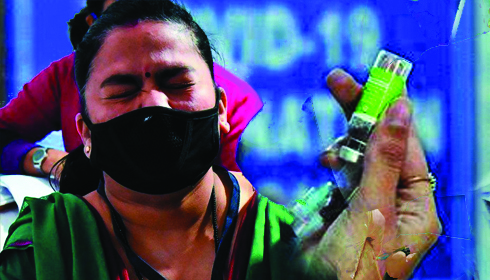
COVID-19 Vaccines Saved Millions, But the Virus Still Lingers: WHO/Europe Study
Introduced in December 2020, COVID-19 immunisations averted at least 59% of pandemic-related deaths, saving about 1.6 million lives in the WHO European Region by March 2023, according to a recent study written in The Lancet Respiratory Medicine. This outcome implies that without vaccinations, the present death toll of 2.2 million may have been as high as 4 million.
Most of those spared were 60 or older, the age range most vulnerable to severe illness and SARS-CoV-2 death. leading author of the study, Dr. Margaux Meslé of WHO/Europe, underlined the significance of this success: "The data are clear: COVID-19 vaccination saves lives. We would have seen many more livelihoods disrupted and families losing their most vulnerable members absent from the large immunisation campaign."
The paper highlights the ongoing difficulties caused by COVID-19, even as these numbers show the success of immunisation campaigns. Though the WHO declared in May 2023 that COVID-19 was no longer a public health emergency of worldwide concern, current data point to a summer wave of COVID-19 infections in many countries across the Region.
This comeback reminds us unequivocally that the virus is not extinct. Hospitalizations are also rising and the percentage of patients with respiratory disorders in primary care environments who have SARS-CoV-2 has increased fivefold during the past eight weeks. Although the general count of diseases is declining from the December 2023 winter peak, the virus still causes major effects.
When the Omicron type was dominant, the WHO/Europe study found that immunisation prevented the most deaths between December 2021 and March 2023. Countries with early and extensive immunisation campaigns—Belgium, Denmark, and the United Kingdom—reaped the largest gains.
Still, the continuation of COVID-19—even in the post-pandemic era—indicates that immunisations by themselves are not enough. The area can go through several waves of disease per year, which strains healthcare systems and puts the most vulnerable at risk. Less competition from other respiratory diseases as well as vacation travel and big crowds have been blamed for the increasing number of infections this summer.
"Although we are now out of the pandemic phase, SARS-CoV-2 continues to infect people and lead to hospitalisations and deaths in our region; thus, COVID-19 vaccination continues to be important for people who are at high risk of severe outcomes if they get infected." Dr. Meslé stressed the need for vigilance.
Maintaining good surveillance is crucial as novel variants develop and proliferate throughout Europe. This lets public health professionals react quickly to protect populations from perhaps more severe versions. Although present immunisations are successful against severe illness and mortality, the region's shift from crisis management to long-term disease control calls for continuous attention and targeted immunisation campaigns.
With the possibility of more waves in the coming months, the course of COVID-19 is yet unknown. "We urge high-risk individuals to remain alert and follow national COVID-19 vaccination recommendations, and Member States in the WHO European Region to continue implementing COVID-19 vaccination, targeting the most vulnerable," Dr. Meslé said later on in her plea for action.